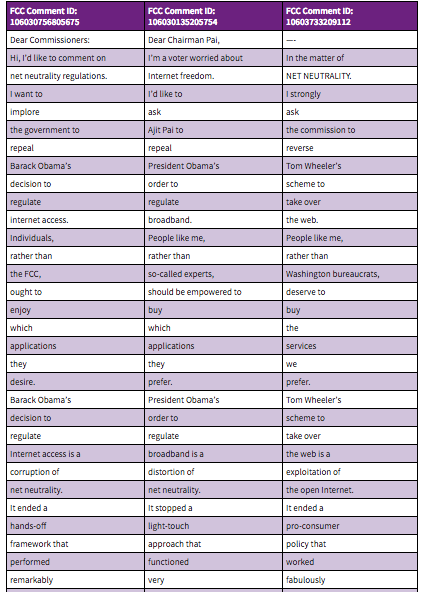The Federal Communications Commission’s proposal to repeal net neutrality regulations was supported in part by bots, according to a recent report from D.C.–based FiscalNote.
The FCC received 22 million comments within the span of two days in May and June, with more than 1 million pro-net neutrality messages fraudulently submitted by bots. A vote to repeal repeal the regulations is set for Dec. 14, and would open the door for internet service providers to speed up, slow down or block any content, apps or sites used by the public.
The FCC proposed the rollback of the regulations last week, but the public comment process that is designed to allow the public to weigh in was happening long before that. In fact, the public comment process on net neutrality set records for the number of comments received.
But many of the comments didn’t come from humans. FiscalNote noted that suspicious email addresses and identical comments were found in the process by others. In a recent analysis, the regtech company found “suspicious” patterns, mainly that a huge number of comments were submitted on two days: May 23 and June 3.
“FiscalNote’s research has taken these investigations a step further, identifying the influence of advanced bots capable of Natural Language Generation (NLG), a subfield of artificial intelligence focused on simulating the production of human language,” according to FiscalNote. “NLG-driven bots are able to craft comments that convey identical meaning through different phrasing, making their presence difficult to detect.”
Here, for instance, are three comments:
FCC Comment ID: 106030756805675
Dear Commissioners: Hi, I’d like to comment on net neutrality regulations. I want to implore the government to repeal Barack Obama’s decision to regulate Internet access. Individuals, rather than the FCC, ought to enjoy which applications they desire. Barack Obama’s decision to regulate Internet access is a corruption of net neutrality. It ended a hands-off framework that performed remarkably well for decades with Republican and Democrat consensus.
FCC Comment ID: 106030135205754
Dear Chairman Pai, I’m a voter worried about Internet freedom. I’d like to ask Ajit Pai to repeal President Obama’s order to regulate broadband. People like me, rather than so-called experts, should be empowered to buy which applications they prefer. President Obama’s order to regulate broadband is a distortion of net neutrality. It stopped a light-touch approach that functioned very successfully for decades with nearly universal consensus.
FCC Comment ID: 10603733209112
In the matter of NET NEUTRALITY. I strongly ask the commission to reverse Tom Wheeler’s scheme to take over the web. People like me, rather than Washington bureaucrats, deserve to buy the services we prefer. Tom Wheeler’s scheme to take over the web is a exploitation of the open Internet. It ended a pro-consumer policy that worked fabulously well for two decades with nearly universal support.
FiscalNote released a chart that identifies the patterns:

Gigi Sohn, a former advisor to former FCC chairman Tom Wheeler, told Wired that the move makes it difficult for public entities to sift through information and take genuine comments seriously.
Additionally, Vlad Eidelman, FiscalNote’s vice president of research, said it muddies the waters for a public that wants to be heard.
“You could generate a lot of comments that would seem legitimate, feel legitimate, and come from legitimate email addresses, but would not be representative of the public voice,” he told Wired.
Read the full story






